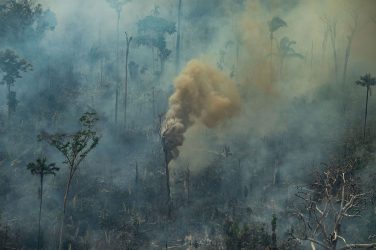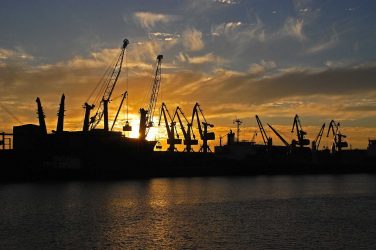 The International Monetary Fund (IMF) is projecting that Brazil will surpass Italy next year and will remain in eighth position globally until at least 2021 which is as far as current forecasts from the organization reach.
The International Monetary Fund (IMF) is projecting that Brazil will surpass Italy next year and will remain in eighth position globally until at least 2021 which is as far as current forecasts from the organization reach.
The IMF estimates Brazilian GDP at US$ 1,95 trillion for next year compared to US$ 1,90 trillion for Italy. In sixth position, India will have a GDP of US$ 2,46 trillion. In 2014, at its peak, the Brazilian economy stood at US$ 2,42 trillion.
In its most recent projections previously released in April, the IMF had estimated that Brazil would remain in ninth position until at least 2021.
The change in scenario is due to a stronger forecast for GDP. Previously the IMF had been forecasting that the Brazilian economy would remain stagnant in 2017 and now is forecasting growth of 0,5%, less optimistic than economists in Brazil who are forecasting growth of 1,30% next year.

The recession this year also has not been as deep as had been expected. The IMF is projecting a contraction of 3,3%, or 0,5 percentage points less than had been forecast previously in its April meeting.
In addition to these factors, the dollar has lost ground in relation to the real (IMF calculations for global GDP are made based on the US currency): in March the dollar was at a high of R$ 3,80 but has settled around R$ 3,25 due to the cooling of political tension related to the impeachment of ex-president Dilma Rousseff.
A return to investment and confidence, a ceiling on expenditure and fiscal reform were the IMF’s principal recommendations for Brazil in its World Economic Outlook report released this week.
Petrobras Roaring Back
Petrobras reached US$ 65.88 billion market value in the São Paulo Stock Exchange on October 7, regaining its status as the second largest publicly traded company by market value in Brazil, behind only Ambev brewing company, which reached US$ 95.73 billion that same day and became the largest company by market value also in Latin America.
According to Economatica, a company that builds and manages databases and develops high performance analysis tools for monitoring stock, securities, investment funds, and numerous indicators in Argentina, Brazil, Chile, Colombia, Mexico, Peru, and the US, Petrobras’s market value rose by $34.33 billion between January and October 7, the company’s third-largest appreciation in nominal terms.
The last time Petrobras led the ranking of largest listed companies by market value was on 15 October 2014, when it hit US$ 79.20 billion, while Ambev reached $77,10 billion.
Petrobras declined to comment.
Limits from Congress
Brazil’s lower chamber of Congress approved the main points of a bill removing a requirement that state-led oil company Petrobras be the sole operator of vast offshore oil reserves in the costly subsalt layer with a minimum 30% stake in their development.
Brazil hopes the rules changes will attract foreign oil companies with resources that the scandal-plagued, debt-ridden Petrobras does not have.
The bill, which could be amended in the future, is aimed at boosting private investment in Brazil’s oil industry, though Petrobras retains the first option to develop promising fields.
The legislation has already been approved by the Senate and passed the lower house 292-101.
The bill, which overturns parts of a 2010 law seeking to increase government control of new offshore oil and gas resources, is part of President Michel Temer’s strategy to revive Brazil’s economy by reducing state intervention and encouraging private entrepreneurs to take up the slack.
Temer, who replaced populist Dilma Rousseff after she was impeached in August for breaking fiscal rules, has promised to adopt more business-friendly policies to pull the economy out of its worst recession since the 1930s.
His government last month unveiled a new concession program to increase private participation in airports, roads and ports as well as in the oil and gas sectors.
The 2010 production-sharing law was criticized for limiting foreign investment in the so-called Subsalt Polygon, a region off Brazil’s coast near Rio de Janeiro where large oil deposits lie far beneath the seabed under a layer of mineral salt.
Inflation
Brazil’s inflation continued its slow fall in September in a positive sign for the new government as it wrestles to end the worst recession in nearly a century. The 12 month rate fell to 8.48%, down from 8.97% August hitting its lowest level for the month since 1998.
For the month, prices rose just 0.08%, far less heated than the 0.44% increase recorded in August. It was the smallest monthly increase since July 2014, when prices rose 0.01% and the lowest increase for a September since 1998.
Food prices, which helped lead the overall rate by shooting up 9.11% between January and August, slipped slightly in September. Transport costs also fell fractionally, while housing rose 0.63%from August and health costs rose 0.33%.
The easing off of price rises will be welcome to regular Brazilians who have been hammered by inflation, rising joblessness and a profound economic slowdown.
President Michel Temer has vowed to take painful austerity measures to return the economy to health. The lower inflation will also boost expectations for the Central Bank to start cutting interesting rates which have been pegged unchanged at 14.25% for the last year.
Lower inflation signals Brazil’s economy is returning to normal, but it remains to be seen whether that trend will be long-lasting, Finance Minister Henrique Meirelles said on Friday.
ABr/MP








